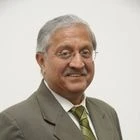R Gopalakrishnan
)
R Gopalakrishnan
R Gopalakrishnan has led in the corporate sector in India for over three decades. He is a former Director of Tata Sons and Vice Chairman of Hindustan Unilever, currently serving as an independent director for various companies. He is also a Distinguished Professor at IIT Kharagpur and has studied at Kolkata University, IIT Kharagpur, and Harvard Business School.
R Gopalakrishnan has led in the corporate sector in India for over three decades. He is a former Director of Tata Sons and Vice Chairman of Hindustan Unilever, currently serving as an independent director for various companies. He is also a Distinguished Professor at IIT Kharagpur and has studied at Kolkata University, IIT Kharagpur, and Harvard Business School.
R Gopalakrishnan
Is business a living machine? The capitalist-enterprise model is broken
The capitalist-enterprise model is broken. It focuses on shareholders, but those who aspire, dream, sweat and yearn are usually not the shareholders, but its employees and vendors
Thomas Mathew's book explores the legacy of Indian business icon Ratan Tata
Politeness is to human nature what warmth is to wax.
Is the capitalistic model broken? India needs many more leaders like Tata
Ratan was not the first group head to receive adulation. Archives show when Jamsetji died in 1904, the public was full of praise and love for him
Ratan Tata: India's business icon and visionary who saw the future
Brand Tata has remained on the top of its list of peers for a gravity-defying period of 85 years - ever since 1939, when the size of India's top corporations was first reported upon
AI must be guided by humanism and compassion, not just tech experts
It is futile to resist change because tech progress is autonomous; nobody oversees developments. Only natural intelligence - humanism, conscience, and compassion of leaders -can provide oversight
A key lesson from Jamsetji to the leader of the future: Develop four Qs
To achieve all that he did in his lifetime, besides IQ and EQ, the Tata group founder must have been rich in adaptability and spirituality quotients too
A leader is just a comma
Long-remembered leaders desist from trashing their predecessors
A toxic triangle
Charismatic leaders by themselves cannot be considered dangerous. But when they acquire cult status and become megalomaniacal, then beware
Megalomania plus cult is dangerous
We box our leaders into a moral binary - all greatness or all sin. The reality is that it is a mix, and what you see is what you get
Change and future-readiness
Profits and growth are the oxygen of business. It is possible to get 'too much' and damage the enterprise irreparably
Leader as 'friction fixer'
Successful friction-fixers are assured of a long-lasting functional job that is for sure
'Greatness' need not mean fame & size
India is right to celebrate big firms, but must also celebrate its valuable small giants
Startup & family business governance
Boards must rely on and act upon early warning signals of behavioural aberrations beyond the boundaries of business sanity and neeyat
The power of neeyat in enterprise
Neeyat is not a new management jargon to replace vision and mission, nor is it an attempt to nativise an Anglo-American concept in Bhartiya hues, but it is relevant for all businesses, big or small
A poetic book on prosaic leadership
Exploring leadership through historical lenses, Moshik Temkin's book offers valuable lessons for larger-than-life leaders of today
Public opinion long before legal judgment
Legal courts follow procedures (niyam) because they seek near-perfect proof; that may be why cases go on interminably
Common sense for CEOs
Steven Bartlett's book offers practical advice for successful managers, especially those navigating the challenges in the middle of the corporate hierarchy
Cumulatively ravaging effects of inequality
The drumbeats of corporate inequality are being heard in many ways - from compensation differentials and working hours to work-from-home and gender pay parity
How wonderful SHE can be
Azim Premji transformed himself from being a businessman into a philanthropist
Management adages vs contextual reality
At the heart of Busted lies a profound truth that dismantles the long-held shibboleths of management

